
I’ve just finished a feverish four-day run of attending “Loads of Curt McDowell” at the Anthology Film Archives, truly a cinematic highlight of 2016 for me; I love McDowell’s work, and much of it is near-impossible to see, hence the exhausting commitment. McDowell arguably captured the queer, freewheeling sexual currents of 1970s San Francisco better than any other filmmaker, and the features and shorts included in “Loads” range from outright smut to ethnography, surrealism to musical to melodrama. It’s a beautiful, dizzying mixture, and I’m posting this fast and artlessly in the hopes of inspiring someone, anyone, to go check out the series as most of it repeats in the next few days.
As well, I’m posting some documents I came across in the archive on the very days of the screenings, a serendipity too delicious to pass up: McDowell’s work has received far too little attention (though you can, and should, read these powerful, brilliant, moving tributes by Johnny Ray Huston and William E. Jones), but I found some reviews in old issues of the gay leather magazine Drummer, which I was examining at the New York Public Library’s International Gay Information Center (for a scholarly piece that may or may not ever come to fruition—but I barely care, it’s really just fun to dig). You wouldn’t necessarily peg Drummer, with its rigid macho vision of masculinity, for McDowell fandom, given his playful, sometimes squirrelly eros–but the magazine’s critics seemed to love him, proof of his utter irresistibility.
But first, a quick recap:
The first McDowell program has left perhaps the fewest traces. In Confessions (1971), McDowell speaks into the camera, to tell his parents of his extensive and adventurous sexual activities, interspersed with scenes of graphic sexual hijinx; it deserves more attention as an embodiment of the gay liberationist coming-out ethos, even if his parents did not, apparently, ever see it. Many of these shorts are musicals, with the bisexual child-murder comedy Wieners and Buns Musical (1972) a particular highlight. I saw A Visit to Indiana (1971) years ago on a bootleg VHS of Loads (below) that I rented at Mondo Video in Los Angeles; that travelogue features the only live cat in the series, and some shots (from my own bootleg of the already-bootlegged rental tape) can be seen over at the cats-of-radical-cinema tumblr that my friend Hannah and I run.
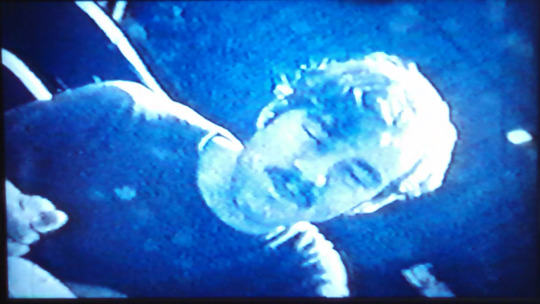
One of the more minor shorts, A Night with Gilda Peck, headlined “ten new mysterious comedies” that played alongside porn in Akron, Ohio, in late 1974; I feel like McDowell would have appreciated this:
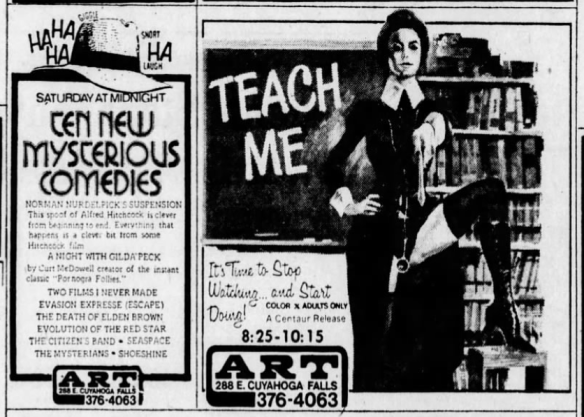
Program 2 is anchored by Loads (1980), McDowell’s salacious, yearning autoethnography of bringing male hustlers back to his spartan apartment in the Mission for filming, j/o sessions, and the occasional hummer. It raises questions (like just about all documentaries) of power relations and exploitation, but none of the men seem terribly put out by McDowell’s creeping on them (a few use straight porn mags to get the job done, one even holding it up to avoid seeing just who’s knocking at his door, but everyone’s pretty casual).
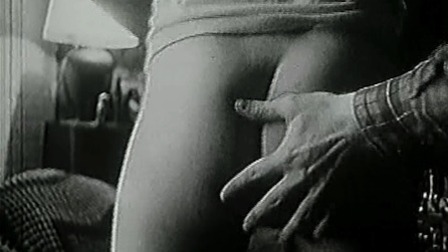
Drummer took note, astutely noting that Loads “is about Curt McDowell’s fetish for heterosexual men, and not a film about the men themselves . . . of all the gay independent filmmakers working today, McDowell is one of the most innovative and unquestionably the most strikingly original.”
The pic looks like garbage, but should be readable on a click-through blow-up; these were shot in haste, forgive me:
The secret gem of Program 2 is Taboo (The Single and the LP), an hourlong surrealist quasi-narrative based on cryptic bathroom graffiti McDowell once came across. It taps into a sense of dread far removed from McDowell’s usual guileless lustiness, and recursively riffs on a few central motifs to great effect. I loved it, and it highlighted some of the ways McDowell’s work differs from his mentor, lover, and friend George Kuchar. They’re easy to lump together under a broad queer/camp sensibility with some serious scat predilections (see Stinky-Butt in Program 1, or just about any Kuchar film), but Kuchar skews more neurotic, McDowell more confidently seductive. Kuchar also positions himself as nerdy and nebbish, but McDowell makes strikingly different use of him as an actor—Kuchar is smoldering, ominous, far more attractive than he allowed himself to appear in his own work. As a brooding husband in Taboo (or maybe it was the musical Boggy Depot, or both), he’s a ringer for young Marlon Brando in one shot!
(According to Michael Guillen, the subjects of the graffiti were real people, and one is still alive—an opportunity for some enterprising film historian to crack the code?)
Program 3 holds its own lost masterpiece, Peed into the Wind (1972). I can find almost nothing online about this film—see a few random Berkeley Barb screening announcements from 1973, found at the valuable alternative press archive Independent Voices—but it is an utterly joyous celebration of perversity (do read Kuchar’s blurb at the program link), from the McDowell-sung 70s-rock theme song (which I’ve been walking around humming for two days now) to the genius opening scene, the single best-framed shot of a man peeing in the history of cinema, sorry Short Cuts. If this film were more available, I know people would frequently quote the line someone tells McDowell’s confused rock star character, Mick Terrific: “You’re not queer, you’re a latent heterosexual!”
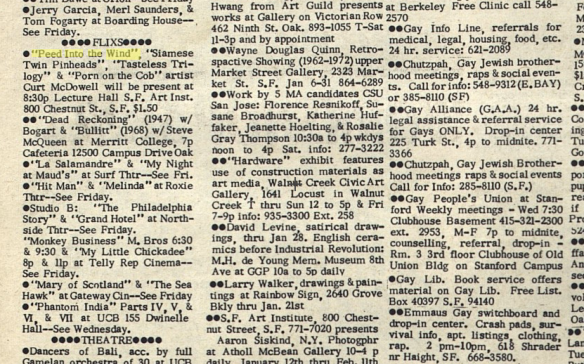
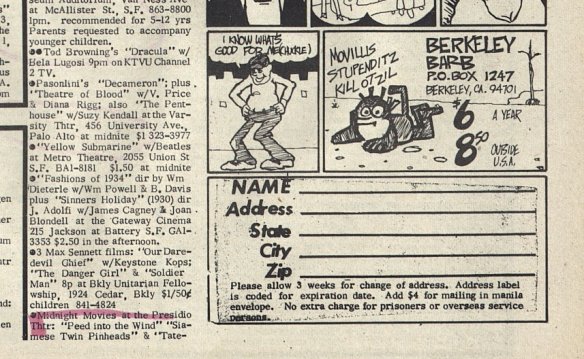
Peed into the Wind–and most of the rest of these three programs–has been lovingly restored by the Academy Film Archive, and looks fantastic; how tantalizing are these rare images? Props to Mark Toscano at the Academy for spearheading that project; here’s to hoping for further McDowell restorations (and also a revival of the great film-preservation blog Toscano kept from 2007 to 2014, ahem).
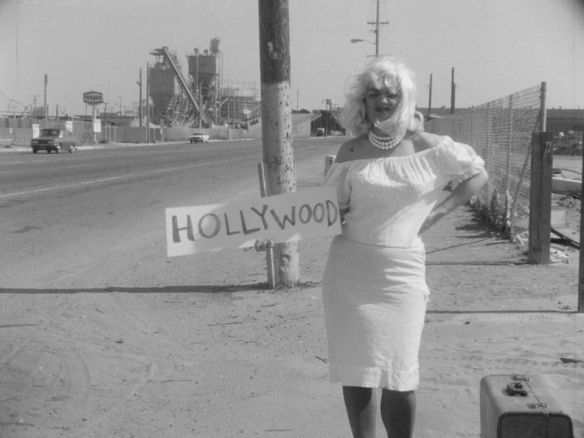
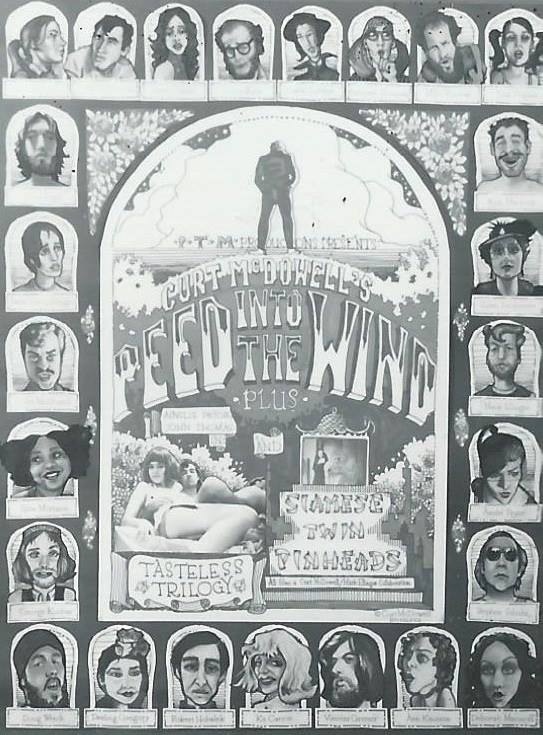
Okay, Thundercrack! I didn’t attend—I have the recent, gorgeous, Synapse DVD (okay, I should have the Blu-ray), and I’m only human. It’s McDowell’s best-remembered film, and the world’s only three-hour black-and-white bisexual hardcore horror film with a gorilla (and not in a non-sex role, either). Truly a marvel to behold, and the subject of great essays by Greg Goodsell in Cashiers du Cinemart #18 and Kevin Heffernan in the collection Peep Shows.
Which then leaves Sparkles Tavern, which just screened tonight. Shot in 1976 but not edited until the mid-80s (and not possessed onscreen of the apostrophe I think it should probably have), it’s structurally and formally McDowell’s most conventional film, a feature-length B&W melodrama about a brother and sister who run a “sing and suck” tavern/bordello unbeknownst to their conservative mother. But arriving in the middle of the reactionary Reagan years, where dreams of a fabricated national past in which the violent suppression of Black, queer, and women’s rights was simply absorbed into the ever-suffocating “family values” superseded helping the AIDS patients who were left to die in the streets, a vision of a family in which brother and sister work the glory holes together (among other things that would not win favor at a GOP convention), Sparkles Tavern is a bracing blast of queer family values. It’s also a love letter to his own sister, Melinda McDowell, who appears in many of his films but takes the lead here, with a beautifully drowsy performance that anchors the film perfectly. Melinda was at the screening, visibly moved by it, and apologized for her performance, but she need not have; she’s a delight.
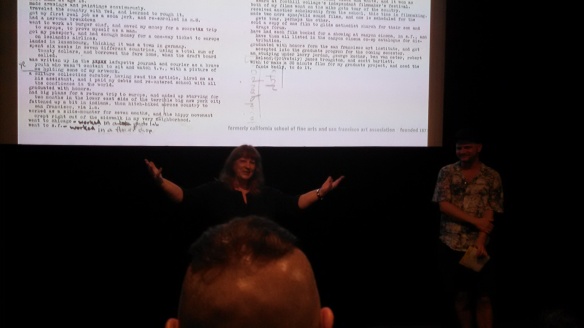
I grabbed that quick shot of her intro, but Drummer also took a liking to the film, listing it on its Best of 1984 list—“the cleanest dirty fun around”!
Drummer critic Penni Kimmel also wrote about a McDowell film I haven’t seen—the Anthology promises more next year, so here’s to hoping—Stand By, a “celluloid extension of the American dream” that grapples with some of the same issues as Sparkles:
This was apparently one of only two surviving prints, screening only once, I’m afraid. Hopefully it’ll return to circulation, it deserves to. Federic E. Kahler wrote a great review on IMDB, even including interview material from George Kuchar (an absolute delight as the magical, sax-blowing Mr. Pupik), and the Seattle Times reviewed it in 1992, less enthusiastically than they should have. I don’t see much else in the way of reviews, so this joins Billy Woodberry’s Bless Their Little Hearts in the Great Lost Films of the 1980s canon.
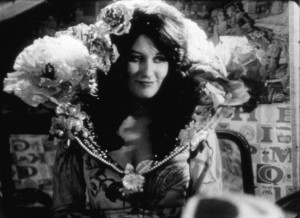
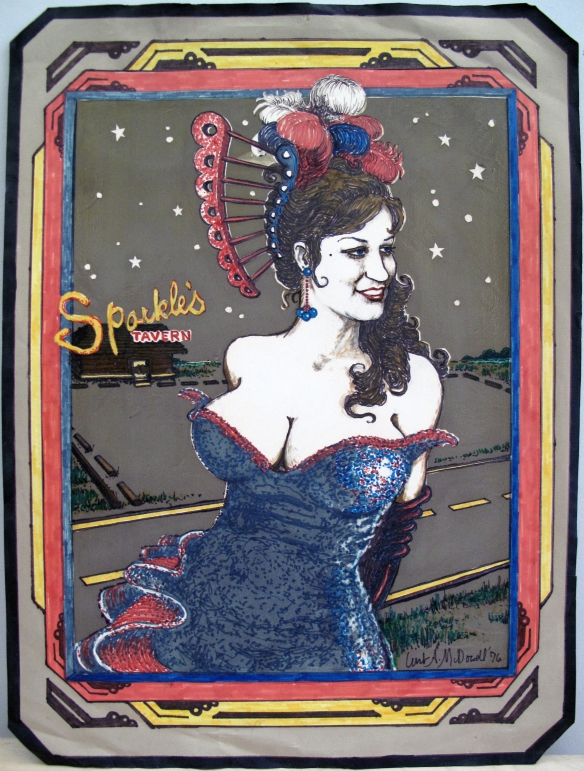
Curt McDowell died a few years later. You can read his brief NYT obituary, and I found the version from his home state of Indiana (Indianapolis Star, 5 June 1987)—which tellingly erased both the word bisexual and AIDS as his cause of death (three decades later, sociopathic pile of shit Indiana governor Mike Pence would continue to disregard HIV/AIDS because it failed to suit his moralism, until he was absolutely forced to deal with the HIV outbreak that his conservative policies helped create).
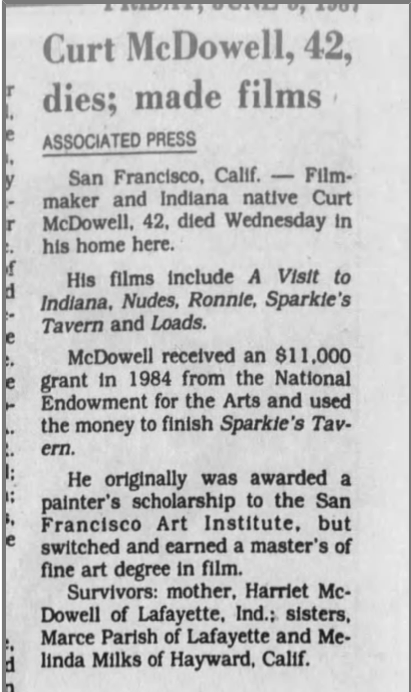
As Melinda told the crowd at Sparkles Tavern, the film really functioned as his dream version of a family acceptance he never quite received from his parents in real life. Fortunately, he had the support of her and the ragtag band of weirdos who populate his films. George Kuchar made one of his best video works about Curt’s dying days, the lovely, poignant Thursday People—you can see a brief preview here, but like so much of Curt’s work, it deserves a wider audience.
At least in Curt’s case, you can be that audience–if you’re anywhere near NYC, and you rush out right away, I guess. For everyone else, fingers crossed that these will be more available soon. They certainly deserve it.

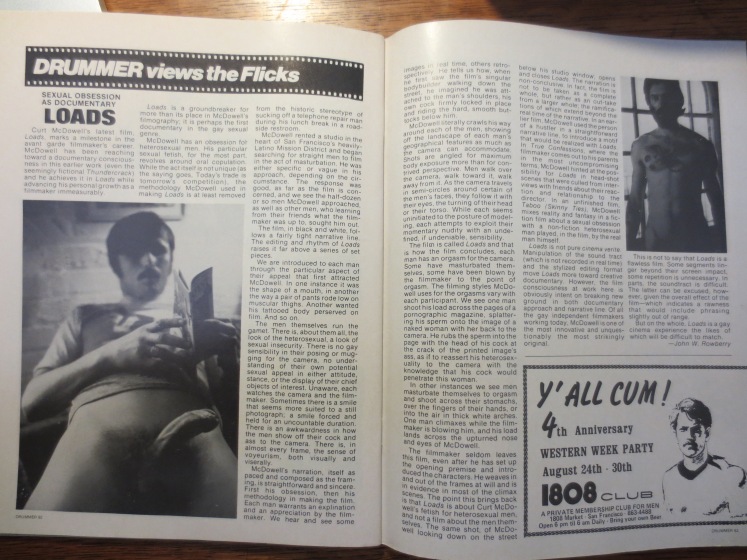
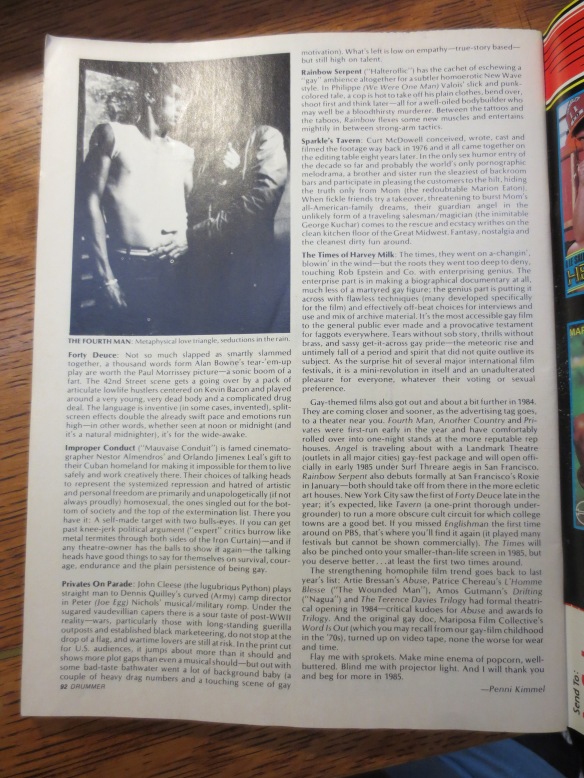
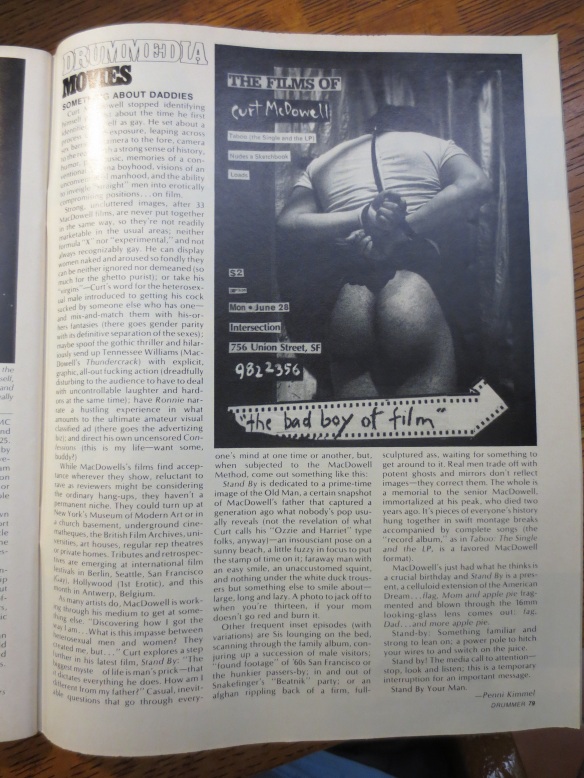
Hello, this is so wonderful…and oh my, your archive ephemera is grand!
So delighted, sent off to Melinda…
Many thanks!
Ps I view your “cat” tumblr regularly…so divine!
Oh wow, thank you so much! And please tell Melinda I absolutely love her screen presence, and that it was a delight to hear her speak of the films and Curt with such affection and love–really a beautiful moment to witness.
Melinda is on Facebook…she would be delighted to hear from you https://www.facebook.com/melinda.milks
Beautiful gorgeous writing—I sent it out to all mentioned and more today.
Were you able to get over to Participant Inc. for the exhibition…up til the 21st!
Many thanks Whit !